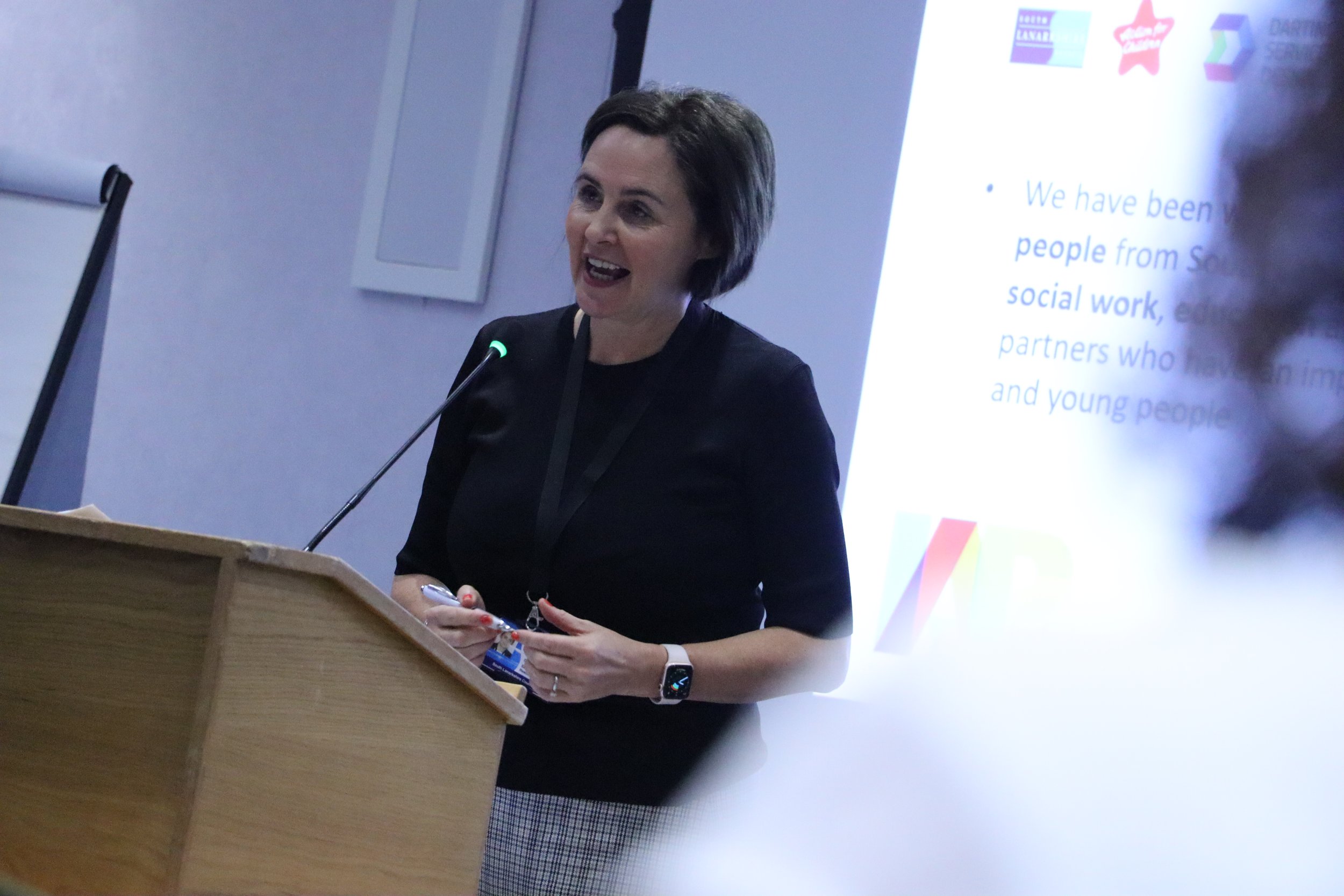Passing the baton of systems change
Head of Design
Communications and Digital Officer
Director of Learning and Impact
Researcher
“Sometimes we hear ‘I can’t believe the children came back.’ Part of the reason for this is because our approach was consistent and adaptable. We didn’t just consult with young people, we co-produced with them, we adapted to them, and we genuinely cared. ”
Throughout our partnership with Inclusion as Prevention we’ve engaged with 98 young people to design and improve services, and early intervention for young people with experience of the justice system. It is estimated that a further 300 also participated through surveys and attending workshops. We’ve tackled challenges, overcome barriers, and learned together as a team to understand the system in South Lanarkshire, to ensure young people aren’t just supported when they enter the justice system, but that the services are there to prevent them from doing so.
The quote above is from Kiera Irvine, Engagement Coordinator for Inclusion as Prevention (IAP). Kiera spoke at our recent learning event for professionals across social services, justice services, education, and leisure, about using co-design to build relationships with young people and adapting to their changing needs and circumstances. Keira offered her insights about the process of engagement with young people – and how this engagement and the focus on building trust and long-standing relationships where ‘you come back’ – was central to the IAP approach. IAP ensured continuous involvement with young people to develop relationships, hear their views and create a platform for change that matters.
Together with Children and Young People’s Centre for Justice, Action for Children and South Lanarkshire Council, we’ve combined systems change, engagement, evaluation, and input from the local authority to test and demonstrate the best ways to involve young people in the design and delivery of supports that affect their lives. We’ve taken a rights-based approach and centred youth voice, whilst adopting a flexible, exploratory, and innovative response to the problems faced.
We’ve been doing this through co-production with young people to reimagine the kinds of support that help them feel included in their communities. Too often young people are excluded from systems of support when they come into conflict with the law. This project fundamentally reframed the work of prevention and early intervention to be young person-centred and inclusive of their diverse experiences and needs.
We have been able to better understand the complexity of challenges that impact young people with experience of the justice system by taking a systems view to consider:
Events – Tests of Change projects
Patterns – Relationships, processes, short-term outcomes, and effects
Structures – Practice, policy, public perception, and societal changes
Last month we spoke at a learning event in South Lanarkshire, where decision-makers and local services were invited to spend the day together exploring the legacy of Inclusion as Prevention and ways they can work together to take systems change forward in their locality. Over 80 professionals attended, to hear about the impact of IAP and the difference it has had on young people.
What have we learned?
“The project had to get comfortable with the unpredictability of the landscape changes, and that’s not easy. We also had to get used to sharing power which wasn’t always easy! It’s a risk to try something new.”
Since IAP began, there has been a pandemic, austerity, changes in the political landscape, and the introduction of the Promise in Scotland. This has led to adapting and changing delivery, meeting young people where they are at and ensuring the programme is flexible in approach. As Kristina highlights in the quote above, it has taken a lot of adjusting to and understanding of power sharing as the project has evolved, alongside managing uncertainty and unpredictability to create meaningful change.
Kristina shared initial findings from the evaluation that has established seven key themes of learning:
Culture Shift and Confidence
Feeling comfortable with discomfort
It’s complicated
Relationships are key
Prioritise communication
Engagement is a skill
Reality of co-production
She highlighted how we’ve developed relationships, overcome barriers and uncertainty, and ways we’ve prioritised meaningful engagement. “Don’t consult and disappear, because that’s not protecting children’s rights. If a consultation is all you have capacity for then make sure it’s done through a rights-respecting lens, show progress, communicate, be clear about expectations and impact,” she explains.
During the day we heard reflections from those working in services about their experience of using systems change and co-production to engage with young people, and influence delivery. The speakers included Karen Ralston, Deputy Director from CYCJ, Claire Borden from Justice Services, Danielle Sarr, Fieldwork Manager from Children’s Services and Kevin Mullarkey, Partnership Planning Manager.
A common thread of learning they shared was recognising the importance of youth voice, deepening relationships, and the evolving nature of the system. As Claire Borden said: “We have seen changes in the system. Coproduction is powerful, and it’s really effective when you do it properly. It’s hard and a bit uncomfortable. What we need to think about as service providers is to create opportunities to stop and listen, but also take action, so that young people can see that their voice can create change. Partnerships have also been key, sharing experiences to create a “round robin” of action and shared experience.”
The final IAP evaluation report is due to be launched early next year. This report will help us pass the baton of the IAP legacy to service delivery managers, decision-makers, and practitioners in the sector.
The formal end date for IAP is December 2023, but the evaluation of current tests of change is still ongoing. If you’d like to find out more about our work to re-design systems of support for young people in South Lanarkshire, please contact Nathan Sheach and Annalise Clelland.










